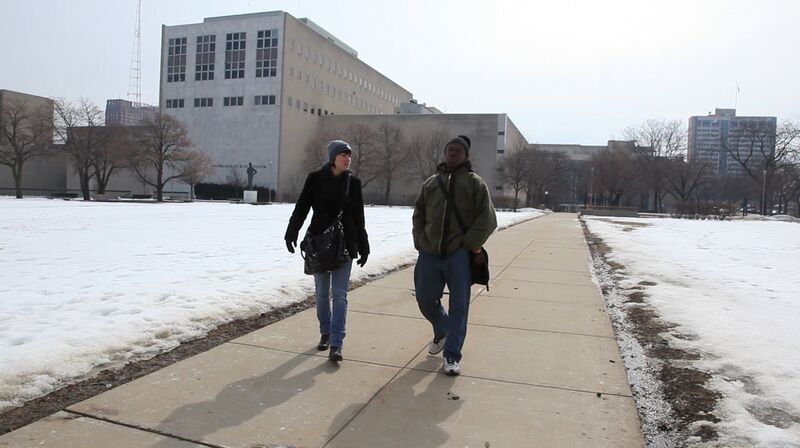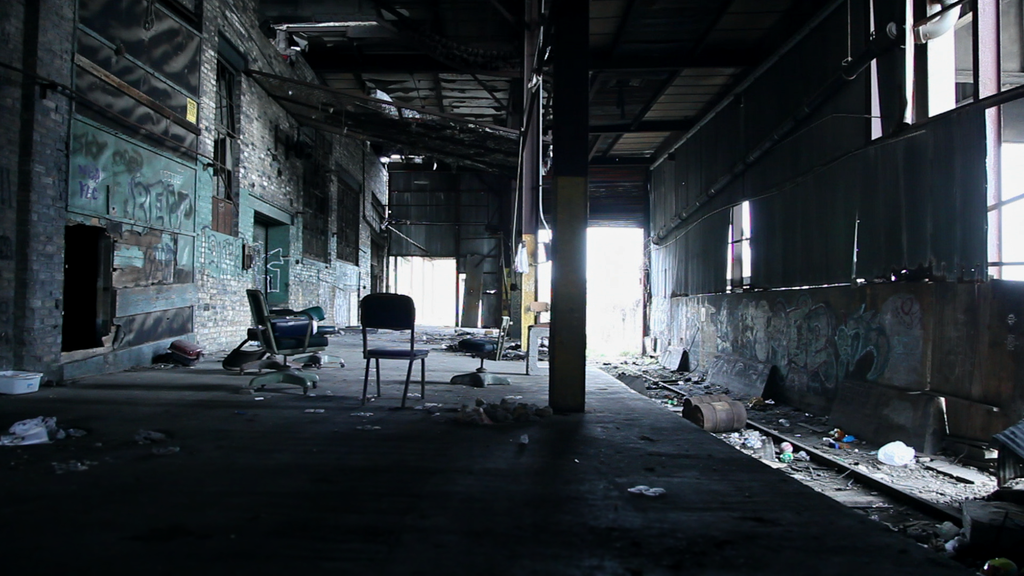Faith Kohler decided to let the homeless tell their stories. She teamed up with producer Jessica Farrell and Cinematography Alex Block and began shooting the film. After 5 years the film is ready to be shown.
To find out more about the project we asked Faith 10 Questions. Check them out below.

FAITH KOHLER: I am an alumna of Wellesley College and Marquette University Law School. I practiced law for a few years, then spent much of my career in federal law enforcement. I am now on the Enterprise Security team at Johnson Controls. Volunteering in a homeless shelter opened my eyes to some of legal barriers that often keep people stuck in an endless cycle of chronic homelessness, and I wanted to share their stories and get people thinking about how we could change things for the better. My neighbor, Dick Blau, was a film professor at UWM, and he connected me with Alex and Jessica (his students at the time) so we could begin making this film. This film has taken shape since 2009, when Jessica and Alex Block and I started filming. I now know just enough to be dangerous around our hard drives.
MMT: What made you want to tell this story?
FK: The people we spoke to offered a glimpse into the way of life of the chronically homeless community. I learned so much about what homelessness is…really is…and it blew away all of the stereotypes I had. I wanted to educate people about the subject of homelessness by showing them the people behind the social issue. We may think we all know a lot about various social issues, but this story is told by the people themselves.
MMT: The movie sounds like it had a lot of obstacles, and working with homeless people can present a lot of adversity? What are a few you have had to overcome?
FK: Not every homeless person we meet is willing - or able - to talk about how they became homeless or why they are still homeless. Many of the people I met when I began this film were reluctant to talk to cops at all, and they were often suspicious of my presence at the shelter. I’ve never shied away from a challenge, and the hardest one was building trust. Harold, whom you see a lot of in our film, was very “in your face” with me about his mistrust of the police when I initially met him. It took a long time for people to realize that I was really just visiting and drinking coffee, not running secret squirrel warrant checks or looking for a wanted person. I’d say overcoming the stereotype that many homeless people attach to law enforcement was the toughest obstacle of all.
MMT: You had a very successful Kickstarter campaign that even got selected as "Project of the Day" by Indiewire and was a Kickstarter Staff Pick. What made you use Kickstarter? And why do you think it was so successful?
FK: It’s funny you should ask that. We had a lot of discussion about how to fundraise. Some of my crowd is old-school, where fundraising means a cocktail party, a short speech, and the checkbooks come out. Jessica’s crowd is more the paperless generation where you can donate money from your iPhone with a fingerprint. I am very middle of the road, and Jessica did all the heavy lifting on it, so we went with Kickstarter. Crowdfunding was an amazing experience because we were supported by many people from the local arts scene as well as complete strangers across the U.S. and from other countries who saw our trailer after it was chosen as a Kickstarter Staff Pick. That’s something that NEVER would have happened at a cocktail party in my living room!
MMT: Do you feel Milwaukee is unique with its homeless problem or is the problem pretty universal?
FK: Every time I look at news online I find another city struggling with the challenge of how to manage a growing homeless population. We have seen it grow increasingly worse over the last few years, but at least the issue is coming to light as more cities try different methods of dealing with this problem. Some cities in particular are:
New York City is currently seeing the largest number of homeless individuals in the country and the largest ever recorded in NYC. Their mayor just declared a "state of emergency" at the end of August 2015 to get more funding immediately to help with housing, shelters, and resources.
Los Angeles has the 2nd largest homeless population in the U.S. and also just declared a "state of emergency" on Sept 22nd, 2015 for $100 million to aid their homeless community with housing, shelter, and resources.
Madison, WI is unfortunately heading the opposite direction than Milwaukee and most U.S. cities because they are trying to increase the criminialization of homeless in their community. They just imposed a sleeping ban in their downtown within the last month and just the made the New York Times on Sept 21st, 2015 in relation to this concern.
MMT: Have you learned anything making the documentary that surprised you?
FK: Everything I learned surprised me. I learned a lot about the issues behind homelessness, a lot about people, a ton about filmmaking and actually a lot about myself.
MMT: What do you hope people get from the documentary?
I want people to remember the people in the film long after they see it. I want them to see homeless people differently and ask themselves how they can help improve conditions for them rather than see them as a problem that should be simply swept off our streets like trash. I want them to see police differently, and the justice system, and to realize that we all are part of the solution rather than just passive bystanders. Homelessness impacts our entire city, not just the people who live on the streets. It’s my hope that at least some of our audience go home with a genuine desire to help fix this.
MMT: How excited are you to be having the world premiere of the film in Milwaukee?
FK: This film was made here, and it’s about the people here…so “thrilled” would be the right word to describe how we feel. For me, as a first-time filmmaker, this is a really exciting time.
MMT: After the world premiere at the Milwaukee Film Festival what are the next plans for the movie?
FK: Filmmaking is often working in the moment and keeping your eyes on the horizon ahead. As we see so many communities struggling to address this concern in the U.S., we are pushing to screen in many communities, especially the communities dealing with similar issues. This is a conversation we all need to be having.
MMT: Now that you had a taste of film making do you plan on making any more films?
FK: Well…I can tell you the next one won’t take this long to make. Jessica, Quinn and Alex have watched my kids grow up and head off to college during the making of this film, and I’m hoping the next one won’t extend past their grad school years. So yes, we’re already working on the next documentary, it’s like we can’t help ourselves.

 RSS Feed
RSS Feed